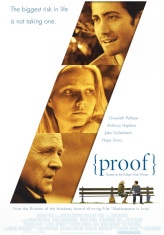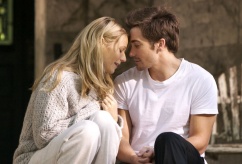| Proof |
| |
 |
USA, 2005. Rated PG-13. 113 minutes.
Cast:
Gwyneth Paltrow, Anthony Hopkins, Jake Gyllenhaal, Hope Davis, Gary Houston, Colin Stinton, Roshan Seth
Writers: David Auburn, Rebecca Miller, based on the play by David Auburn
Original Music: Stephen Warbeck
Cinematography: Alwin Küchler
Producers: John Hart, Jeff Sharp, Alison Owen, Robert Kessel
Director: John Madden
LINKS
|
 h-oh.
h-oh.
If you see a lot of movies, that's sometimes the reaction you experience when you see the words “based on a play” in the opening credits. Too often filmmakers think it's enough simply to take the play outside and roll cameras. Perhaps they'll write a couple new scenes referenced indirectly in the source material. That doesn't usually result in much of a movie, though.
Words are a playwright's most powerful tools. In a film, as the saying goes, an image is worth a thousand of those words. In a film, silence can be more powerful than words. Thus when most major plot developments occur via wordplay, a film can feel limited even where the original play is brilliant.
Proof is no exception. This is a decent film that could have been a great film if it had been re-imagined for the screen, instead of merely brought to the screen. It remains married to its words and bound to its limited sets. You don't learn anything about the characters that doesn't emerge through their words. Proof tells you its story instead of showing it to you.

Gwyneth Paltrow (as Catherine) and Jake Gyllenhaal (as Hal) share a moment in Proof. |
Proof concerns a reclusive young woman named Catherine (Gwyneth Paltrow) who has no friends and no life apart from the television in front of which she likes to fall asleep. This is because she has spent the past several years taking care of her father Robert (Anthony Hopkins), a brilliant mathematician who took leave of his sanity many years prior. When Robert passes away, Catherine must deal with the arrival of her overbearing sister Claire (Hope Davis), the attentions of Robert's former student Hal (Jake Gyllenhaal), and the possibility that she may be inheriting her father's illness.
Davis's Claire, one of those annoyingly self-absorbed people absolutely convinced of their selfless altruism, jumps to the conclusion that Catherine is indeed clinically wacky. Ironically, it is the obsessive compulsive Claire who may be the more unbalanced of the two, but the film doesn't take up this possibility beyond establishing that two sisters are oil and water (often quite humorously so). Mousy Catherine has her father's passion and talent for mathematics as well, but is suppressing a mountain of unresolved anger over having sacrificed her life to his care. Career-minded Claire is more concerned with wedding registries and jojoba.
Meanwhile, Hal is convinced he will find a seminal mathematical proof among Robert's written ravings. When one does emerge, the question of its origin makes all their lives even more complicated. Of course, Catherine knows the answer to the puzzle all along. If your protagonist knowingly holds the key to the film's central question, it's a bit of a false mystery. There's nothing to investigate. You're just waiting for the film to get around to revealing the answer.
Whether Catherine is going bananas is potentially a much more intriguing issue, but the nature of Robert's illness remains vague. Nobody seems to have thought through this element of the story beyond its necessity as a device, and Hopkins' slightly hammy performance is of no help. You don't get the impression that they understand crazy any better than Claire does. Neither do you get the impression that anybody involved in this production understands higher mathematics. (How can depression be mathematical, anyway?) Proof represents misunderstood mathematicians in the same way that films generally represent misunderstood artists. Are there truly parallels, or does Proof view the sciences from an artistic perspective simply because it is a product of the arts community? (See, e.g., Good Will Hunting, the product of the brilliant scientific minds of Ben Affleck and Matt Damon.)
Proof does many things well, though. Though not particularly suited for the screen, the source material is intelligent and robust, which comes across in this adaptation. With director John Madden of Shakespeare in Love at the helm, who has a facility with strongly verbal material (and not, incidentally, with other kinds of material like Captain Corelli's Heaping Pile of Steaming Crap), shooting it with momentum and drive. Proof divulges its secrets slowly, which keeps you hanging on the characters' dialogue, regardless of how artificial the story might appear in retrospect. Proof has a sense of humor as well, like when Catherine triumphantly presents Claire with “Harold Dobbs” (Hal), after Claire becomes convinced he is a figment of Catherine's imagination.
Proof reunites Paltrow with Madden, with whom she won her Oscar for Shakespeare in Love, and it's obvious they have a solid working relationship. Paltrow has more to chew on and shows more acting skills here than she has in a long time. (View from the Top, anyone?) A cool, angular actor, she's not really suited to either glam roles or girl-next-door parts. She can occasionally pull one off (Shallow Hal), but she's at her best in films like Proof and The Royal Tenenbaums. Too much so, perhaps. Catherine is so sullenly bitter and willfully difficult that you would sympathize with Claire's desire to slap her silly were Claire not even more hateful. Davis is an even better actor than Paltrow, though—so versatile and so credible as Claire that you find yourself wishing she was a few years younger so she could have played Catherine herself.
On second thought, screw how old Davis is. She should have played Catherine anyway.
Review
© October 2005 by AboutFilm.Com and the author.
Images © 2005 Miramax Films. All Rights Reserved.


